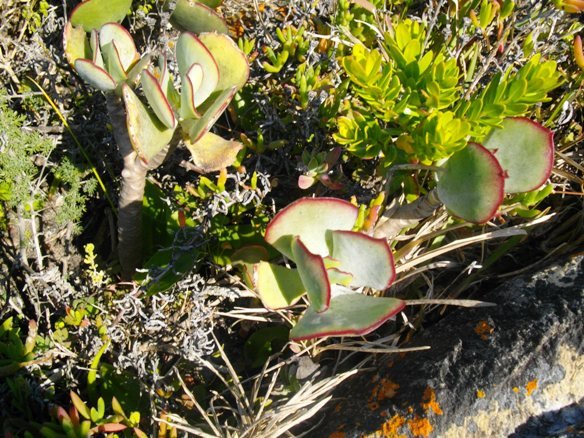Rainbow nation of plants

Author: Ivan Lätti
Photographer: Thabo Maphisa
A rainbow nation would thrive on peaceful coexistence in shared living space in spite of differences. How this is done by plants may be of interest to people trying to find the formula. Factors like soil type, altitude, seasonal changes that regulate water, wind and temperature patterns, plant eating bugs, pollinators and seed dispersers are the given challenges within every micro-ecology. Every member has to grasp opportunities as best it can for coping with the threats and fitness tests of the day.
Equal rights don't enter the equation due to the variety of needs. Equal outcomes in life are rare to negligible, even where equal input is artificially attempted, like in the way many families try to treat their children. Sharing of resources is not regulated but competed for in life struggles, amidst signs of coexistence everywhere.
The grass, asparagus, milkwort, plakkie (pigs ear), vygie and other inhabitants of the little spot in picture all found places to grow by chance processes in their high density neighbourhood. Survival is determined by individual capitalisation on unique "personal" circumstances. The sometimes cruel fate of birth place, wherever the seed happens to fall and germinate cannot be escaped. The size and nature of neighbouring plants form a natural part of the life faced in almost all types of vegetation. It is done with equanimity, no matter what life or death events occur in nature.
Humanity uses physical power, democratic force, voting numbers, science, manmade laws or money to dominate. The alternative of tolerating diversity and loving the neighbours is growing, but coexistence a hard challenge.
Plants know nothing about these lofty subjects, but left to their own devices they usually end up increasing diversity without xenophobia blooming. Animals in nature without humans achieve the same. Those that get eaten are normally replaced, the species surviving better than individuals, although no species lives forever.
All the laws conceived by humanity has never brought about absolute safety; only cyclically prolonged human life expectancy for shortish periods under unsustainable conditions. Improvements in society are achieved and lost in cyclic societal dreams about improved governance systems. The tenets of every civilisation, even the largely failed ones, or historical phases of self-inflicted chaos through war, fit into the timeless laws of nature. Always part of nature, never above it.
In the bigger real world of organic civilisation sequences, the laws of nature continue to play havoc with illusions of fairness, constitutional rights and binding agreements among grey-haired people. The fortunes of the extant other species on earth will be part of what people might experience or achieve in times to come.
But for now humanity rules the roost. Its rights and wrongs undergo continual facelifts as human endeavours shape what the hypothetical, reasonable person believes is best.

